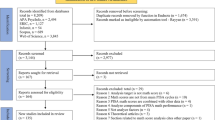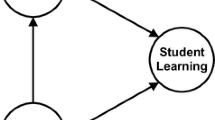Abstract
This study aims to disentangle the complex relationships among student attributes, school context, and student performance in mathematics and science in Trinidad and Tobago, using the PISA 2009 data. Our findings reveal that schools account for a substantial amount of variation in students’ mathematics and science performances. School socioeconomic status (SES) had a significant effect on student achievement. Additionally, school SES had the single largest effect on mathematics and science achievement among the sample of students of all the explanatory variables. Students who never repeated primary school and who came from two-parent homes outperformed their counterparts on both subjects. Interestingly, females outscored males in science, but there was no significant gender difference in mathematics. These findings suggest the important role of school context in understanding student performance in Trinidad and Tobago and the Caribbean.
Similar content being viewed by others
References
Bailey, B. (2004). Gender and education in Jamaica: Who is achieving and by whose standard? Prospects, 34(1), 53–69. doi:10.1023/B:PROS.0000026679.99139.91.
Bailey, B. (2009). Explaining gender differences in school performance throughout the Caribbean. In Inter-American Development Bank & Caribbean Development Bank (Eds.), Literacy and numeracy in the Caribbean: Report of the Caribbean subregional meeting (pp. 95–115). Bridgetown, Barbados: Inter-American Development Bank (Regional Policy Dialogue on Education) and Caribbean Development Bank.
Benavot, A., & Tanner, E. (2007). The growth of national learning assessments in the world 1995–2006. Background paper prepared for Education for All Global Monitoring Report 2008. Paris: UNESCO.
De Lisle, J. (2009). External examinations beyond national borders: Trinidad and Tobago and the Caribbean Examination Council. In B. Vlaardingerbroek & N. Taylor (Eds.), Secondary school external examination systems: Reliability, robustness and resilience (pp. 265–290). New York: Cambria Press.
De Lisle, J., Smith, P., & Jules, V. (2005). Which males or females are most at risk and on what? An analysis of gender differentials within the primary school system of Trinidad and Tobago. Educational Studies, 31(4), 393–418.
De Lisle, J., Smith, P., & Jules, V. (2010). Evaluating the geography of gendered achievement using large-scale assessment data from the primary school system of the Republic of Trinidad and Tobago. International Journal of Educational Development, 30(4), 405–417. doi:10.1016/j.ijedudev.2010.01.001.
De Lisle, J., Smith, P., Keller, C., & Jules, V. (2012). Differential outcomes in high-stakes eleven plus testing: The role of gender, geography, and assessment design in Trinidad and Tobago. Assessment in Education, 19(1), 45–64. doi:10.1080/0969594x.2011.568934.
Elley, W. B. (1992). How in the world do students read? IEA study of reading literacy. The Hague: International Association for the Evaluation of Educational Achievement.
George, J., Quamina-Aiyejina, L., Cain, M., & Mohammed, C. (2009). Gender issues in education and intervention strategies to increase participation of boys. Trinidad and Tobago: Ministry of Education.
Gosine, A. (2007). Marginalization myths and the complexity of “men”: Engaging critical conversations about Irish and Caribbean masculinities. Men and Masculinities, 9(3), 337–357.
Halpern, D. F., Benbow, C. P., Geary, D. C., Gur, R. C., Hyde, J. S., & Gernsbacher, M. A. (2007). The science of sex differences in science and mathematics. Psychological Science in the Public Interest, 8(1), 1–51. doi:10.1111/j.1529-1006.2007.00032.x.
Hanushek, E. A., & Woessmann, L. (2008). The role of cognitive skills in economic development. Journal of economic literature, 46(3), 607–668. doi:10.2307/27647039.
Jackson, C. K. (2010). Do students benefit from attending better schools? Evidence from rule-based student assignments in Trinidad and Tobago. The Economic Journal, 120(549), 1399–1429.
Jackson, C. K. (2012). Single-sex schools, student achievement, and course selection: Evidence from rule-based student assignments in Trinidad and Tobago. Journal of Public Economics, 96, 173–188. doi:10.1016/j.jpubeco.2011.09.002.
Jeynes, W. H. (2007). The relationship between parental involvement and urban secondary school student academic achievement: A meta-analysis. Urban Education, 42(1), 82–110.
Jules, V., & Kutnick, P. (1990). Determinants of academic success within classrooms in Trinidad and Tobago: Some personal and systemic variables. Educational Studies, 16(3), 217–235.
Jules, V., & Panneflek, A. (2000). Education for All in the Caribbean assessment 2000: Lighting the way forward—The state of education in the Caribbean in the 1990s (Vol. 2). Subregional Synthesis Report. Paris: UNESCO.
Kreft, I., & De Leeuw, J. (1998). Introduction to multilevel modeling. London: Sage.
Kreft, I. G. G., De Leeuw, J., & Aiken, L. S. (1995). The effect of different forms of centering in hierarchical linear models. Multivariate Behavioral Research, 30(1), 1–21.
Kutnick, P. (1999). Quantitative and case-based insights into issues of gender and school-based achievement: Beyond simplistic explanations. Curriculum Journal, 10(2), 253–282.
Kutnick, P. (2000). Girls, boys and school achievement: Critical comments on who achieves in schools and under what economic and social conditions achievement takes place—A Caribbean perspective. International Journal of Educational Development, 20(1), 65–84. doi:10.1016/s0738-0593(99)00045-0.
Kutnick, P., & Jules, V. (1988). Antecedents affecting science achievement scores in classrooms in Trinidad and Tobago. International Journal of Educational Development, 8(4), 305–314.
Kutnick, P., Jules, V., & Layne, A. (1997). Gender and school achievement in the Caribbean. London: Department for International Development.
Leacock, C. (2009). Quality education for all in the Eastern Caribbean: Rethinking the curriculum in the face of universal secondary education. Journal of Eastern Caribbean Studies, 34(3), 19–38.
Martin, M. O., Mullis, I. V. S., Foy, P., & Stanco, G. M. (2012). TIMSS 2011 international results in science. Chestnut Hill, MA: TIMSS & PIRLS International Study Center, Boston College.
Mullis, I. V. S., Martin, M. O., Foy, P., & Arora, A. (2012). TIMSS 2011 international results in mathematics. Chestnut Hill, MA: TIMSS & PIRLS International Study Center, Boston College.
Mullis, I. V. S., Martin, M. O., Kennedy, A. M., & Foy, P. (2007). PIRLS 2006 international report: IEA’s progress in international reading literacy study in primary school in 40 countries. Chestnut Hill, MA: TIMSS & PIRLS Intenational Study Center, Boston College. http://timss.bc.edu/isc/publications.html.
National Mathematics Advisory Panel (2008). Foundations for success: The final report of the National Mathematics Advisory Panel. Washington, DC: US Department of Education.
OECD [Organization for Economic Co-operation and Development] (2010a). PISA 2009 results: What students know and can do—Student performance in reading, mathematics and science (Vol. 1). Paris: OECD.
OECD (2010b). PISA 2009 Results: What makes a school successful? Resources, policies and practices (Vol. 4). Paris: OECD. doi:10.1787/9789264091559-en.
Puryear, J., & Goodspeed, T. O. (2011). How can education help latin america develop? Global Journal of Emerging Market Economies, 3(1), 111–134.
Raudenbush, S. W., & Bryk, A. S. (2002). Hierarchical linear models: Applications and data analysis methods (2nd ed.). Newbury Park, CA: Sage.
Raudenbush, S. W., Bryk, A. S, Cheong, Y. F., Congdon, R. T., & du Toit, M. (2011). HLM 7 for Windows [Computer software]. Skokie, IL: Scientific Software International.
Rumberger, R. W., & Palardy, G. J. (2005). Test scores, dropout rates, and transfer rates as alternative indicators of high school performance. American Educational Research Journal, 42(1), 3–42.
Shavelson, R. J., McDonnell, L. M., & Oakes, J. (1989). Indicators for monitoring mathematics and science education. Santa Monica, CA: Rand Corporation.
Sirin, S. R. (2005). Socioeconomic status and academic achievement: A meta-analytic review of research. Review of Educational Research, 75(3), 417–453. doi:10.3102/00346543075003417.
Sriskandarajah, D. (2005). Development, inequality and ethnic accommodation: Clues from Malaysia, Mauritius, and Trinidad and Tobago. Oxford Development Studies, 33(1), 63–79.
White, K. R. (1982). The relation between socioeconomic status and academic achievement. Psychological Bulletin, 91(3), 461–481.
Wolff, L. (2004). Educational assessments in Latin America: The state of the art. Applied Psychology, 53(2), 192–214.
Wolff, L., & de Moura Castro, C. (2000). Secondary education in Latin America and the Caribbean: Challenge of growth and reform. Report EDU-111. Washington, DC: Inter-American Development Bank.
World Bank (1993). Caribbean region: Access, quality, and efficiency in education. Washington, DC: World Bank.
World Bank (1995). Priorities and strategies for education: A World Bank review. Washington, DC: World Bank.
World Bank (1999). Educational change in Latin America and the Caribbean. Washington, DC: World Bank.
Author information
Authors and Affiliations
Corresponding author
About this article
Cite this article
Alexander, V., Maeda, Y. Understanding student achievement in mathematics and science: The case of Trinidad and Tobago. Prospects 45, 577–591 (2015). https://doi.org/10.1007/s11125-015-9373-y
Published:
Issue Date:
DOI: https://doi.org/10.1007/s11125-015-9373-y




